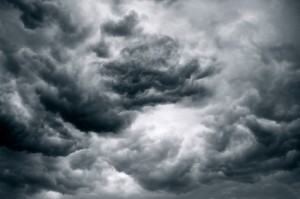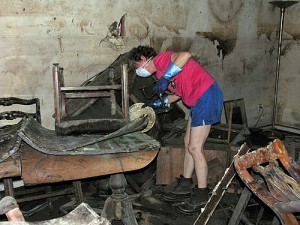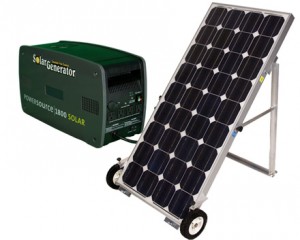As every new natural disaster occurs, each of you probably wonders what the effect would be on you and your family. If you are truly honest with yourself, you realize you probably aren’t as prepared as you should have been or could have been in a similar situation. Luckily this time it isn’t your family that needed the preparation. Surely by next time, you’ll be prepared…surely.
 Unfortunately, it’s probably not realistic to think that you will be. As a culture, we are procrastinators for the most part, and even if you aren’t a procrastinator as an individual, you have inevitably been hit in some form or another in this economic downturn. Everyone can be affected by an economic downturn, whether it is by choosing to be more prudent, or having to be—not by choice.
Unfortunately, it’s probably not realistic to think that you will be. As a culture, we are procrastinators for the most part, and even if you aren’t a procrastinator as an individual, you have inevitably been hit in some form or another in this economic downturn. Everyone can be affected by an economic downturn, whether it is by choosing to be more prudent, or having to be—not by choice.
In the wake of this most recent series of weather events, it’s a good time to reevaluate your situation, and at least make an effort to complete all this planning that you’ve been doing on your off-the-grid setup. This lifestyle is like an insurance plan, and you need to treat it as such.
The more you pay for protection, the less you will suffer when something bad happens. The less you pay for protection, the more you will have to endure when something comes along. To be really covered, where you don’t have to worry about the “repair” (i.e. you won’t have to suffer through much of a lifestyle change) you will need to make a heavy investment in your “insurance premium” (i.e. your setup and supplies, alternative energy generation etc.). It’s simple: the more you invest and plan, and actually prepare for, the less you will have to deal with in an event. Ideally, like with a full-coverage type of insurance plan, you would want to have a major occurrence seem like nothing more than an inconvenience, rather than a life-altering event.
If you aren’t prepared, or are less prepared than you thought, then you will sustain some losses. In order to understand where your planning is lacking, it’s important to understand the amount you face to lose. The high cost of being unprepared in a major occurrence can be derived from many different sources, and things which may have never affected you before will likely become an expensive and dangerous obstacle.
What do you stand to lose?
In a FLOOD:
 In a flood, you could lose vehicles, pets, and if you’re not careful, people. The highest monetary damage comes in the form of structural damage and ongoing damage occurring from the basic building materials becoming waterlogged. Mold can grow within 48-72 hours (especially when organic materials mix with water), and leach into the structure of your home, like in the case of a mudslide or a natural flood (meaning not one caused by leaving the water faucet on in the basement). Even with clean fresh water, mold can grow quickly.
In a flood, you could lose vehicles, pets, and if you’re not careful, people. The highest monetary damage comes in the form of structural damage and ongoing damage occurring from the basic building materials becoming waterlogged. Mold can grow within 48-72 hours (especially when organic materials mix with water), and leach into the structure of your home, like in the case of a mudslide or a natural flood (meaning not one caused by leaving the water faucet on in the basement). Even with clean fresh water, mold can grow quickly.
Who is affected: those below the water table, those with naturally occurring water nearby (including tanks and municipal storage facilities), and those with lean or poor drainage soil/foundations.
Items to plan for: Sump pumps, solar or alternative energy sources placed well above the expected flood levels (though solar is going to be king here, especially a movable system) with enough juice to run these energy intensive pumps almost around the clock. Bags for sand, (most areas prone to flooding keep stores of sand around but run out of bags, or can’t control the public when they come for sand), alternative fuel cooking platforms (devices like camping stoves, or waterproof fuel type grills), a raised shelving system that can be secured, or a platform that can hold your electrical energy system, to avoid contact with water. Also: practical knowledge about how to shut off fuel sources and secure precious items, as well as how to navigate or determine currents, and how to survey the waterscape.
Why you should plan: Most homeowner’s insurance policies don’t even cover moisture in any capacity. Add to that: earthquake insurance, mold insurance and structural damage caused by natural disasters in known areas of high risk. Flood insurance in areas where floods are prevalent is expensive (much more so than a solar setup to run a couple of sump pumps). In a prolonged state of disaster (think: Katrina in New Orleans, LA), it could be years before some sort of real monetary aid, or insurance/settlement comes back to a homeowner. By the time the settlements come around, foreclosures or credit issues and everything that comes along with those can already have made a negative impact on you as a homeowner.
Cost to prepare for the average dwelling: $1800-$6500 up front, and maybe 1-2k every few years for maintenance and to expand your system. This number is for partial home setups, or “emergency setups”.
 Potential Cost of damage to an average dwelling (1600-2500 sq. feet):
Potential Cost of damage to an average dwelling (1600-2500 sq. feet):
- Simple flood/water damage at 2 feet of structure: $15-$100k
- Ongoing mold damage: $55k+
- Chance of loss of life or property: undeterminable monetary value, but certainly the most devastating loss
In an EARTHQUAKE:
Who is affected: Those who live along fault lines regardless of how many times the fault line has been active, and those who have never seen earthquakes as dangerous, even though they have experienced them.
Items to plan for: Gas shut-off tools, fire protection, alternative fuel cooking equipment (ideally without a flame), and alternative energy generation equipment (mobile solar is most efficient considering disruption to landscape).
Why you should plan: Earthquakes can happen virtually anywhere, as we have seen these past two years or so, and it is even more pressing to be prepared when you live on the fringe areas of a fault line, as city and industrial/commercial building codes and standards do not include stringent earthquake-safe measures. Residential planning does not take into consideration the earthquake safety techniques and materials in the building process. Typically these types of earthquake-resistant practices are only on small items, like securing water heaters to a wall, or in some cases, dryers and gas ranges to the walls. The need for preparation is heavy in these areas on the fringe of active fault lines. Also important, is the fallout effect of a major earthquake upon the surrounding areas, as people will move away from the epicenter in search of help, supplies, and shelter. Whether you consider yourself a person who wants to help, or a person who wants to be protected against rioters and an influx of people into your area, you should understand the situation as people move away from the center of an earthquake occurrence, seeking items and shelter. Having extra power generation can be key to helping out or to avoiding concerns when dealing with large groups of people moving outside the epicenter in a major occurrence. You can provide help only if you have the capability of doing so—you can make the difference in friend’s or family’s successful recovery.
Cost to prepare for the average dwelling: $1800-$6500 upfront, and maybe 1-2k every few years for maintenance and to expand your system for partial home setups, or “emergency setups”. This isn’t about whole house preparation; this is about mobile applications of energy generation, and survival/emergency preparedness equipment/resources.
Potential Cost of damage to an average dwelling (1600-2500 sq. feet): One could lose everything in a major earthquake without much recourse, but to lose everything material could only be overshadowed by losing a family member or a friend as a result of not being prepared enough to help, or to survive during the aftermath of such an event.
It could be an earthquake, a hurricane, a tornado, or the subsidiary aftereffects like flooding and fire. If you don’t survive a major event, your survivors will  need to be able to continue on. Either way you look at it, it’s important to be prepared for the aftermath of a weather event, a geopolitical/military event, or even just an extended blackout. Being off the grid isn’t an all or nothing concept—it is a continually expanding and evolving endeavor which strives to keep you and your family safe and comfortable.
need to be able to continue on. Either way you look at it, it’s important to be prepared for the aftermath of a weather event, a geopolitical/military event, or even just an extended blackout. Being off the grid isn’t an all or nothing concept—it is a continually expanding and evolving endeavor which strives to keep you and your family safe and comfortable.
You need to start somewhere.
- Emergency kit including medical and first aid items, a communications device and a fire source
- Fresh water in large quantities for all in your party
- Mobile power generation and battery backups, to capture the most energy during peak times
- Food storage to some extent (usually 72 hours is sufficient for each person as an emergency stash)
- An understanding of basic survival techniques, first aid techniques, and conflict avoidance techniques
The above is a good place to start and here’s why:
A proper emergency kit will keep you out of trouble for all but the most extreme situations, and will give some comfort in the form of heat and light as well as knowing you can treat small first aid needs. Your communications devices can range from hand-cranked radios, to an unlocked cell phone with a couple of different SIM cards, to a satellite phone. Any one of these will be helpful; all of them together could be the difference between rescue and being left behind.
Fresh water is essential in any situation, especially in stressful and traumatic situations. An adequate amount will be the difference between life and death in many cases, and this is the cornerstone to your off-the-grid program.
Mobile power generation can help not only keep you alive, but avoid complication from a number of other factors. Using solar-generated electricity and sump pumps to pump water out of your basement from flooding can help you avoid sickness, mold, and extended water damage. Using solar-generated electricity to run a hotplate can create a flame-free way to cook food. Hot food is a morale booster and can increase energy consumption in the body. Using solar generated electricity, heating water (which may be otherwise dangerous due to contamination) can kill bacteria and viruses.
 Notice there is a heavy emphasis on “solar-generated electricity” here; it’s due to the portability and versatility of the units. Wind power can’t be reliably derived during a major weather event, and even if it could be (the ancillary units typically don’t take that into account when being installed, and might be installed in the path of rising water, or cracking foundations), it shouldn’t be relied upon as an emergency option. Hydro electric energy is too expensive and too unpredictable during a weather event to be used reliably. Hydro is a whole-home permanent electrical generation technique/system. Solar cells can take usable light (to some extent) and can use the heat/light from the sun to convert it to electricity in a high efficiency manner, and is almost unbeatable in its utility after a major event. Backup batteries will ensure you are capturing the most energy when the sun is out, and have enough to run items more consistently.
Notice there is a heavy emphasis on “solar-generated electricity” here; it’s due to the portability and versatility of the units. Wind power can’t be reliably derived during a major weather event, and even if it could be (the ancillary units typically don’t take that into account when being installed, and might be installed in the path of rising water, or cracking foundations), it shouldn’t be relied upon as an emergency option. Hydro electric energy is too expensive and too unpredictable during a weather event to be used reliably. Hydro is a whole-home permanent electrical generation technique/system. Solar cells can take usable light (to some extent) and can use the heat/light from the sun to convert it to electricity in a high efficiency manner, and is almost unbeatable in its utility after a major event. Backup batteries will ensure you are capturing the most energy when the sun is out, and have enough to run items more consistently.
Food is extremely important in any scenario, much like water is, so plan accordingly and get your storage up to speed by first planning for emergency rations.
Knowledge is power. The first settlers, pioneers, explorers, and natives all used knowledge as their most important asset in thrashing out a living in harsh and uncontrolled environments. Read up, take notes, share information regularly with your family, and have a plan in place for emergencies and for your desired style of living post event.
In the aftermath of major occurrences, like the one suffered by East Coasters as recently this past week, it is important to understand that anything can happen at any time. Credit is due to those who were prepared enough to stave off infections, sicknesses, cold, hunger, and death as a result of their forward thinking and sound investments. There are many who were not able to do so.
The cost of not being prepared can range from a few hundred dollars to the loss of a loved one, or even your own life. The only sure thing about the potential cost of not being prepared is that it is ALWAYS more expensive fiscally, emotionally, and physically than it is to simply plan ahead and make an initial investment in the equipment, tools, training, knowledge, and items that will make you fit for surviving the worst that nature and the world can throw at you.
©2011 Off the Grid News
———————————————————————————————–
 Off The Grid News Better Ideas For Off The Grid Living
Off The Grid News Better Ideas For Off The Grid Living



